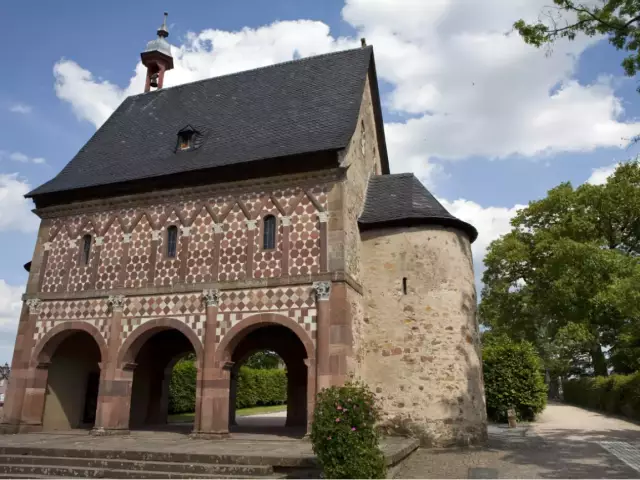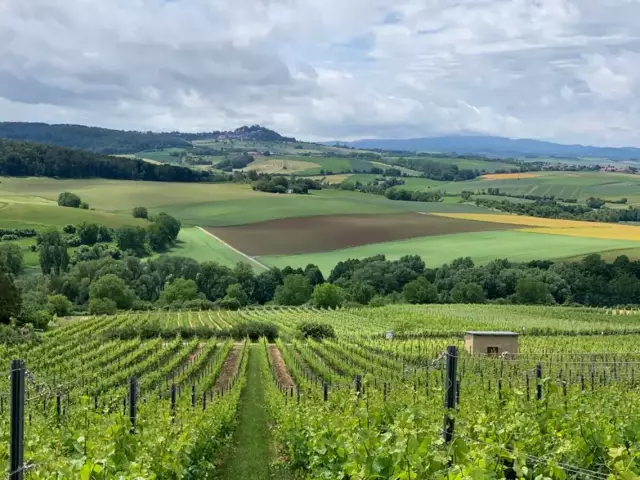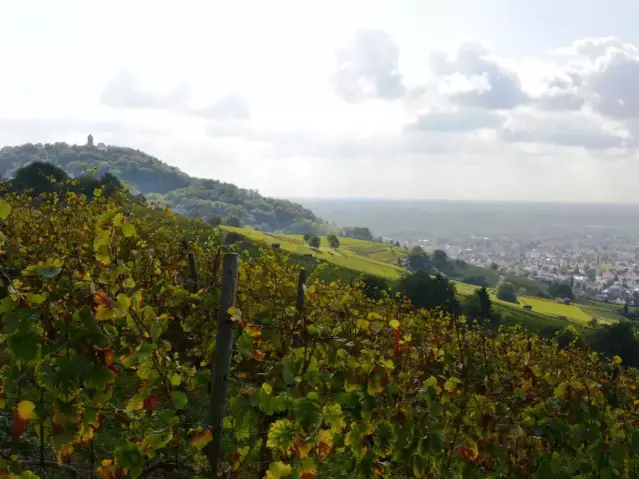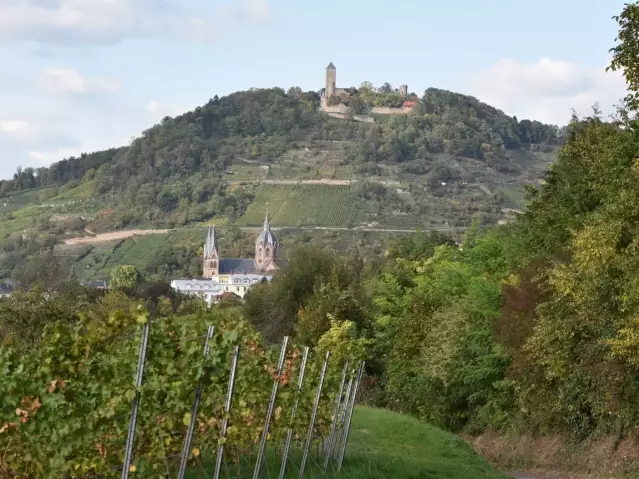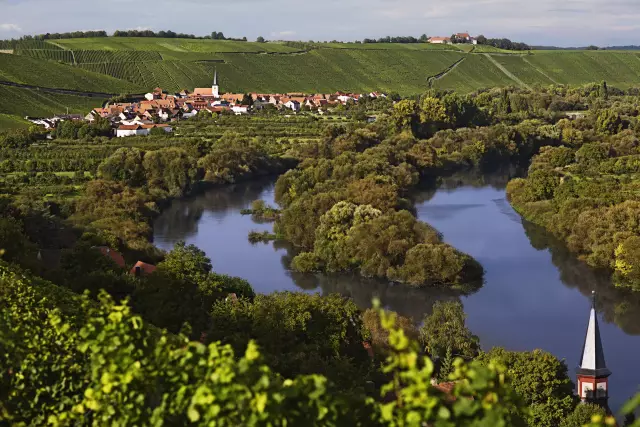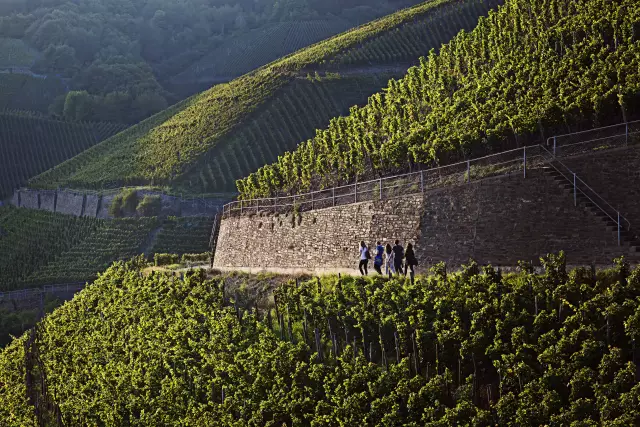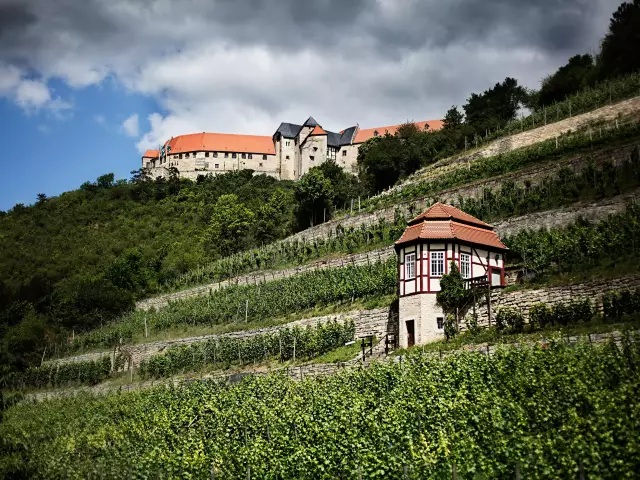Hessische Bergstraße
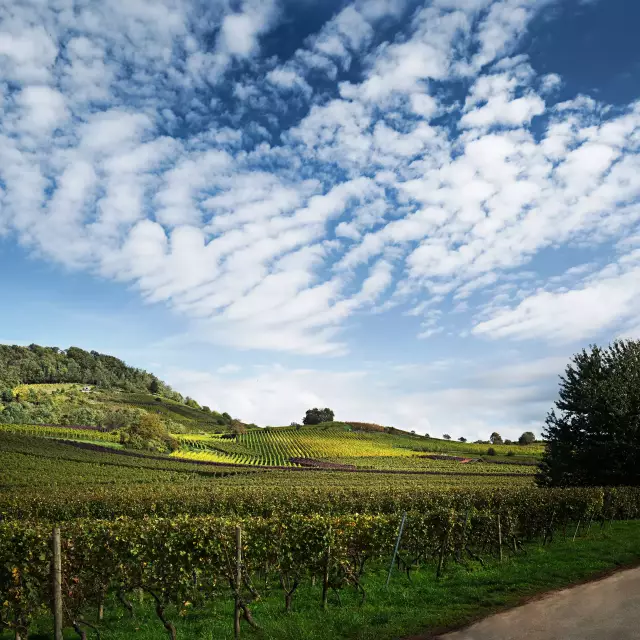
When it is still cool in March or April in some places, the almond blossom already begins on the Hessian Bergstrasse. Spring usually starts a few days earlier.
Facts
-
462 ha
Vineyard area 2021
-
23
single vineyards
Hessische Bergstraße - Spring awakening
Spring and almond blossoms usually come to the Hessische Bergstrasse earlier than other regions, which may still be feeling chills in March or April.
Forsythia, cherries, apricots and magnolias follow the almond trees. But it is not only the beautiful nature that you can enjoy here, the picturesque old towns of Zwingenberg, Heppenheim, Alsbach or Bensheim will seduce you with their charms. The lively towns along the old Roman road "strata montana" contrast with the quiet valleys of the Odenwald. You will quickly feel at home here sipping a good wine from the Bergstaße and savouring the game and trout from the Odenwald.
This Hessian part of the Bergstrasse has been an independent wine-growing region since 1971, divided into two separate areas: The Starkenburg Region begins south of Darmstadt with sporadic vineyards, then south from Zwingenberg the vineyards become more frequent. A focus on wine-growing can be found in Auerbach, Bensheim and Heppenheim. This area ends south of Heppenheim on the Hessian border. The second, much smaller area - the "Odenwald Wine Island" - bears the official name "Umstadt Area". Its center is the city of Groß-Umstadt.
The best vineyards can be found on the slopes of the Rhine Valley, many of which are very steep. At the Melibokus near Zwingenberg, the highest mountain in the region, the upper parts of the vineyards are terraced, making them very labour-intensive yet picturesque.
In the small wine-growing region, mainly dry and semi-dry wines are produced. The Riesling grape is predominant and complemented by Rivaner, Pinot Gris, Silvaner, Kerner and Pinot Blanc. Red Riesling is a rarity and grown on around 20 hectares. The red varieties Pinot Noir, Dornfelder and St. Laurent are slowly gaining ground.
The Bergsträßer Weinlagenweg is a wonderful hiking trail through the middle of the wine-growing region. The varied, hilly landscape offers great views of the Odenwald and the Rhine plain. Every year on May 1st, the young winemakers invite you to a hike in the vineyards between Heppenheim and Zwingenbergand as part of the spring awakening, the Bergsträßer wine meeting takes place in Bensheim.
The larger wine festivals also offer the opportunity to get to know the wine of the Hessische Bergstrasse, which is rarely found outside of the growing region. For example, at Pentecost near the end of May, Zwingenberg hosts a wine festival in the historic market square, whilst Bensheim and Groß-Umstadt celebrate in September. The Bergstrasse wine market in the old town of Heppenheim traditionally offers a representative wine selection at the end of June. If you cannot visit during a wine festival, you can seek these rare wines locally in the numerous Bergstrasse wine taverns.
Overview Hessische Bergstraße
Geographical location: Bordered by the Rhine on the west and the protective Oden Forest on the east, the Hessische Bergstraße extends from Darmstadt to just north of Heidelberg. The region also boasts a small "island of wine" near Groß-Umstadt on the eastern outskirts of Frankfurt.
Major town(s): Bensheim, Heppenheim
Climate: Ample sunshine and sufficient precipitation for vines to thrive
Soil types: The soils are varied, ranging (north to south) from porphyry-quartz to weathered granite to sand and loess-loam
Vineyard area (2022): 462 ha · 2 districts · 3 collective vineyard sites · 20+ individual sites
Grape varieties 2022 [white 79% · red 21%]: Riesling (36.4%), Pinot Gris (12.8%), Pinot noir (10.8%), Pinot Blanc (5.6%) and Silvaner
Marketing: More than half of the region's wine-growers deliver their grapes to the regional cooperative cellars in Heppenheim. The State Wine Domain in Bensheim is the region's largest vineyard owner. Given the small size of the region, Bergstraße wines are scarce and mostly consumed by its locals only.
Signposted routes through wine country: The route B-3 (driving) traverses the length of the Bergstraße. The Bergsträßer Weinlagenweg (hiking) is a marked path through the vineyards from Zwingenberg to Heppenheim.
Varietals

Highlights of wine culture in Hessische Bergstraße
Wineries in the area
-
Show
Bergsträßer Winzer eG
Heppenheim
Winesights
Vinotheques
-
Show
Bergsträßer Winzer eG
Heppenheim
Wine hike Wine and Stone Adventure Trail
A very special experience of art, knowledge and nature, is a hike on the "Wine and Stone Adventure Trail" in Heppenheim on the Hessische Bergstrasse, inaugurated in April 2007.
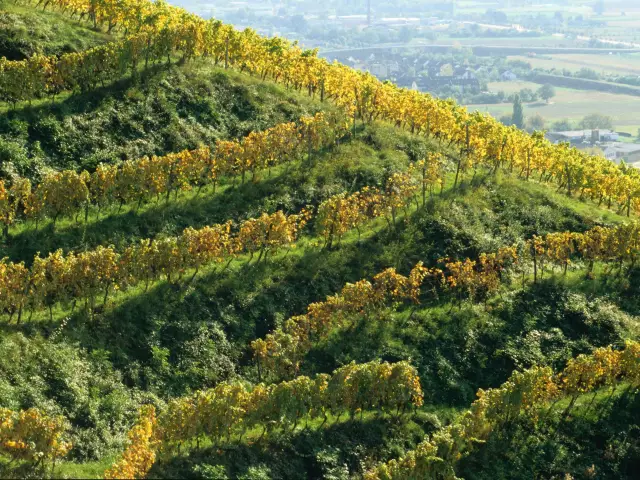
Contact
-
Weinbauverband Hessische Bergstraße e.V.
64646 Heppenheim (Bergstraße)- Kettelerstraße 29 Hessen Germany



